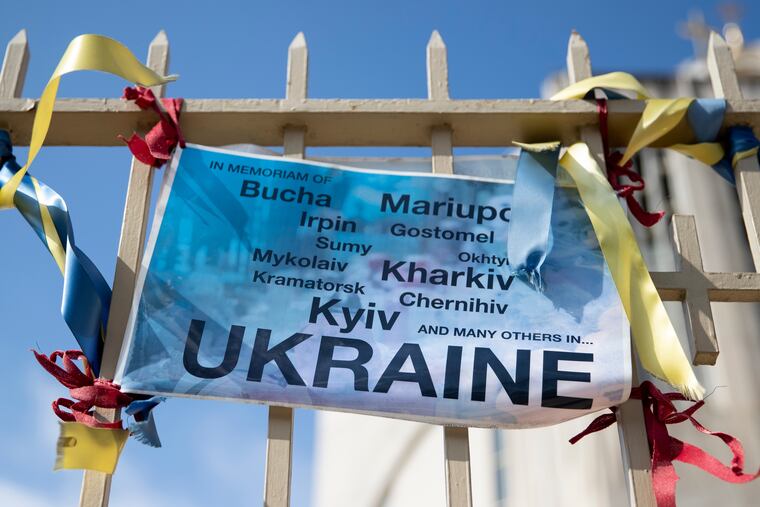Marchers in Philadelphia say you don’t need to be Ukrainian to protest against Russia and its war of destruction
“It’s almost immaterial these days if one is Ukrainian or not,” a longtime Philadelphian said. “There is a real shock when we see that we can’t assume that [our freedoms] will be there forever.”

The worship service at the Ukrainian Catholic Cathedral of the Immaculate Conception on North Franklin Street in the Poplar section of Philadelphia was relatively routine Sunday morning.
A few hundred people sat in the polished pews as the February sun streamed through the church’s colorful stained-glass windows and some of the younger congregants squirmed in their seats. The Rev. Roman Pitula spoke, as he has since last February, about both the church’s mission of service to the community and the effects of the war that Russia unleashed in Ukraine one year ago.
It was after the service that Pitula and others put an exclamation point on the day. Capping a weekend that marked the one-year anniversary of Russia’s all-out invasion on Feb. 24, 2022, Pitula and dozens of men, women, and children marched 1.3 miles from the church to Independence Hall in a dramatic show of support for Ukraine.
Waving the blue-and-yellow flags of Ukraine, singing traditional songs, and accompanied by a handful of police officers on bicycles, the group linked up with more marchers near the Liberty Bell and later drove to Jenkintown for an afternoon rally. The idea behind the march, organizers said, was to reinforce the idea that the war, even though it’s thousands of miles away from this church, touches everyone.
» READ MORE: 'It happened so quickly.' A Wilmington family finds safety in Poland after fleeing the war in Ukraine
“If you see other people suffering and you don’t support them, it means something is not right in society,” Pitula said. “This is not supposed to be happening in the middle of Europe in the 21st century.”
It’s not surprising that Pitula, Iryna Mazur, and Ulana Mazurkevich, organizers of this march and other activities in support of Ukraine, were so busy this weekend. They have direct links to Ukraine and intimately experience the tragic daily events as the war grinds on.
Not so David Godfrey-Thomas. The 67-year-old is from London, has spent the last 25 years in Philadelphia, and considers himself “an honorary local.” He is a longtime friend of Mazurkevich, but it’s not his connections to friends or family in Ukraine that sent him to the church on Sunday.
It was, he said, his concern that freedom for everyone else is endangered by Russia’s aggression. “It’s almost immaterial these days if one is Ukrainian or not,” he said. “There is a real shock when we see that we can’t assume that [our freedoms] will be there forever.”
Mazurkevich, president of Philadelphia’s Ukrainian Human Rights Committee, and Mazur, honorary consul of Ukraine to Philadelphia, can tick off many ways Americans have supported Ukraine since the invasion. They cite fund-raisers from individuals and groups, and political backing and military aid from the United States government.
That support, Mazur said, while anchored by Ukrainian Americans, also springs from many people worldwide with no ties to Ukraine because “we share the same values.” She said: “Americans understand that it’s not about something financial or trying to gain something. It’s about the fundamental value of a human being wanting to be free.”
Mazurkevich said an attorney friend was so moved by the devastation of the war that he went to Bucha to drive an ambulance. “It touches all people,” she said. “When you see a mother holding a child and crying because her husband is leaving for war, it affects you. It tears your heart out.”
Philadelphia Councilmember David Oh and Scott Heppard, district chief of staff for U.S. Rep. Brendan Boyle, spoke to the crowd before the march, and Steve Rukavina, president of the National Federation of Croatian Americans Cultural Foundation, said, “I’m here to show my respects for the Ukrainian people and to honor their fallen heroes.”
For Godfrey-Thomas, it’s not essential to be part of an ethnic coalition or even know where Ukraine is on the world map. It’s more important, he said, for folks to stay in touch with their humanity and remember how fragile their existence is.
“In Russia, we see what the alternative to freedom looks like,” he said. And it does not matter who the victims are.
“This war is a renouncing of everything I’ve ever believed in,” Godfrey-Thomas said. “It has to be defeated.”